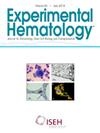RNA methylation: where to from here for hematologic malignancies?
IF 2.1
4区 医学
Q2 HEMATOLOGY
引用次数: 0
Abstract
RNA methylation and the machinery that regulates or “reads” its expression has recently been implicated in the pathogenesis of acute myeloid leukemia (AML) and other hematologic malignancies. Modulation of these epigenetic marks has started to become a reality as several companies around the world seek to leverage this knowledge therapeutically in the clinic. Although the bases of observed activity in AML have been described by numerous groups, the exact context in which these therapies will ultimately be used remains to be properly determined. While context is likely to be of great importance here, a more “global” mechanism of action might allow for more widespread applicability to multiple disease subtypes. In other areas such as the myelodysplastic and other preleukemic syndromes, data remain sparse. Ongoing work is needed to determine whether therapeutic modulation of RNA modifications is a viable and biologically plausible approach in these cases. Regardless of the outcomes, this is an exciting era for “epitranscriptomics” as we navigate a pathway forward. Here, I describe the current knowledge around RNA methylation and hematologic malignancies at the end of 2024 including some of the relevant questions that are yet to be answered.
RNA甲基化:血液恶性肿瘤的方向是什么?
RNA甲基化和调控或“读取”其表达的机制最近被认为与急性髓性白血病(AML)和其他血液系统恶性肿瘤的发病机制有关。随着世界各地的几家公司寻求在临床治疗中利用这些知识,这些表观遗传标记的调节已经开始成为现实。虽然在AML中观察到的活性基础已被许多研究小组描述,但这些疗法最终将被使用的确切背景仍有待适当确定。虽然上下文在这里可能非常重要,但更“全球性”的作用机制可能允许更广泛地适用于多种疾病或疾病亚型。在其他领域,如骨髓增生异常和其他白血病前期综合征,数据仍然稀少。在这些病例中,需要进行工作来确定治疗性的RNA修饰调节是否是一种可行的和生物学上合理的方法。无论结果如何,这都是“表观转录组学”的一个激动人心的时代,因为我们在前进的道路上导航。在这里,我描述了目前关于RNA甲基化和血液恶性肿瘤的知识,包括一些尚未回答的相关问题。
本文章由计算机程序翻译,如有差异,请以英文原文为准。
求助全文
约1分钟内获得全文
求助全文
来源期刊

Experimental hematology
医学-血液学
CiteScore
5.30
自引率
0.00%
发文量
84
审稿时长
58 days
期刊介绍:
Experimental Hematology publishes new findings, methodologies, reviews and perspectives in all areas of hematology and immune cell formation on a monthly basis that may include Special Issues on particular topics of current interest. The overall goal is to report new insights into how normal blood cells are produced, how their production is normally regulated, mechanisms that contribute to hematological diseases and new approaches to their treatment. Specific topics may include relevant developmental and aging processes, stem cell biology, analyses of intrinsic and extrinsic regulatory mechanisms, in vitro behavior of primary cells, clonal tracking, molecular and omics analyses, metabolism, epigenetics, bioengineering approaches, studies in model organisms, novel clinical observations, transplantation biology and new therapeutic avenues.
 求助内容:
求助内容: 应助结果提醒方式:
应助结果提醒方式:


